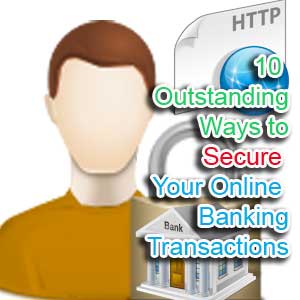
Securing your Online Banking Transactions picture
Throughout the years, it's been very easy to do online banking for the computer savvy people. But for the newbies who might be also afraid to touch a computer mouse to do banking in the internet, they fear the internet. They fear the security pitfalls that online banking have. They're afraid that someone could easily identify or hack their bank account if they do online banking.
For newbies in online banking, do not fear. Online banking gives you more power (more time and save more money) than traditional "fall-in-line" system in the bank. And if you'll not utilize the power of online banking, you might be left behind in doing the smart and more convenient way of banking.
To cast away your fears, I will show you here a list of 10 Outstanding Ways to Secure Your Online (internet) Banking Transactions. This will apply also when you create accounts in all other websites out there:
1. Create a hard-to-tell username/user id and password. Avoid using your name and birthday because they can be easily identified. Example for a hard-to-tell username is "QVi3ti3iVQ" and for the password "x8m$k#Mcdt>". A combination of small and capital letters, number and special characters is recommended.
2. Create unique usernames/user id and password in every bank websites or other websites. Do not use the same username and password for every websites. If ever you've enter a fake or phishing website, you can avoid revealing your real username and password you've used in bank websites.
3. Make list of of your accounts in a Microsoft Excel. Time to time, your list of accounts will grow as you sign-up and create accounts in different websites. Creating a list of your website accounts in a Microsoft Excel makes it more organized and more convenient. It's easy for you to retrieve whenever you log-in a bank website or any website you want. You can just copy the username and password from the excel and paste them to a website when you log-in.
4. Check the domain name or url address of the website (www.examplebank.com) before logging in. Be sure you familiarize the url address of the website of your bank. In this way, you can avoid entering in a fake website.
5. Log-out or sign out after you did online banking transactions.
6. Delete browser settings, history and cookies after signing out.
7. Avoid telling our username and password in the email. If you received an email allegedly coming from your bank (which is not true) that requests you to provide your username, password, birthday, address or any other private information, do not believe this kind of email. It's a phishing/fake email. Banks don't send such kind of emails that will request your private data.
8. Do not tell to anyone about your username and password. Keep it private.
9. Use a private computer when you transact online banking. Do not use a computer in an internet cafe. It is not safe. The internet cafe might have a keylogger that will record every keyboard strokes you've entered. Thus, revealing your most-keep private information. Servers of some internet cafes have access to the computer you are using that will tempt them to enter in your USB drive or figure out anything you've doing in that computer.
10. Install an antivirus in your computer. There are many free antivirus out there. You can search it in Google, download it and install. Antivirus will help you block, delete and detect unwanted programs/virus in your computer. Most computer viruses gathers and steal private information of your computer. So be sure to have an updated antivirus.
If you have more ideas on how to secure online banking transactions, you can post them in the comment below. We'll be glad to add them in this list and indicate your name or website as the source. - https://www.affordablecebu.com/